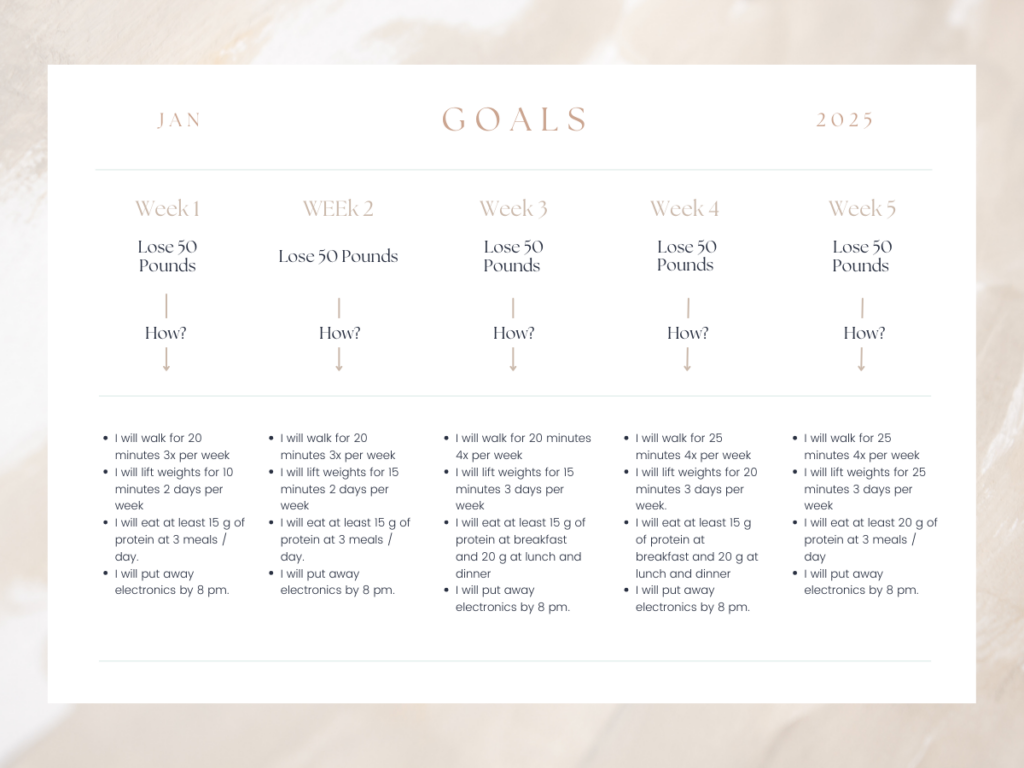
In this lull between Christmas and New Years, do you find yourself reflecting on the past year and making lists of the things you hope to accomplish in the upcoming year? Maybe you feel inspired to set resolutions and make positive changes. Maybe you have even made New Year resolutions in the past, but they fizzled out by February. The key to creating lasting, meaningful change lies in setting the right kind of goals with an effective system in place to get you there. Today, we’ll explore two powerful types of goals: outcome goals and process goals. Together, they form the foundation for sustainable progress.
Outcome Goals: Dream Big
An outcome goal is the end result you want to achieve. It’s your big-picture objective, the reason you’re putting in the effort. Some examples of outcome goals include:
- Running a 5K (or achieving a specific finish time).
- Losing 40 pounds.
- Lowering cholesterol to a healthy range.
- Overcoming diet mentality to enjoy all foods without guilt.
The best outcome goals are ambitious—they should stretch you and feel like a “dream big” moment. While they might seem a little daunting or even unrealistic at first glance, remember the old adage: “Shoot for the moon. Even if you miss, you’ll land among the stars.”
For example, let’s say your outcome goal is to run a half marathon, and that’s a big stretch for you because currently, you can’t run more than a mile. Even if you don’t reach the full 13.1 miles, the journey is likely to lead you to running more miles than you can now—a significant accomplishment in its own right. The beauty of these lofty goals is that they’re not just about achieving a result, but also about the person you become and the habits you build along the way. So even if you never run the half marathon, but you easily run a 5K, isn’t that a still big win?!
An outcome goal is great for giving you direction, but once you’ve set your outcome goal, it’s time to shift your focus. Tuck that big goal away for now and direct your energy toward process goals—the smaller, actionable steps that will ultimately lead you closer to achieving your desired outcome. This switch is important because focusing solely on your outcome goal can feel overwhelming and impossible, making you more likely to give up.
Process Goals: Focus on the Journey
If outcome goals are the destination, process goals are the roadmap. These are the small, specific, and manageable steps you take to make progress. They’re designed to feel achievable, even easy, to avoid overwhelm.
For instance, if your outcome goal is to run a marathon, your process goals might look like this:
- Week 1: Walk or run 1 mile three times.
- Week 2: Run 1.25 miles once and walk 2 miles once.
- Week 3: Run 1.5 miles twice and walk 3 miles once.
Whatever the process goal is, it should feel light and easy. If it doesn’t, make the goal smaller and build up slowly.
The key to effective process goals, aside from making them feel easy, is making them specific, measurable, and binary. For example, instead of setting the goal to drink more water, which is not specific, measurable ( how much more? More than what?) or binary, you can improve your process goal by adding details like how much water and how many days you want to hit the goal. So it might sound like, “I will drink at least 70 ounces of water four days this week.” There’s no ambiguity. At the end of the week, you will know without any doubt if you hit the goal or not. . . that’s what I mean by binary. It’s a yes or no. You either hit the goal or you didn’t and there’s no in between.
Unlike outcome goals, achieving your process goal should be completely within your control. For example, consider these two process goals:
- I will lose 1 pound this week.
- I will exercise 4 times this week.
You don’t have any real control over goal 1. You can take steps that might help you lose a pound during the week, but there’s no way you can guarantee that weight loss. But the second goal is completely within your control. You might not want to do it, but you can, with 100% certainty, exercise 4 times if you choose to.
Process goals should also be framed positively. Instead of saying, “I’ll stop eating junk food,” try, “I’ll snack on fruit when I’m craving something sweet.” This shift reduces resistance and helps rewire your brain for success.

Embrace Imperfections and Learn From Setbacks
No one is perfect, and missing a goal is not a failure—it’s an opportunity to learn. Reflect on what got in your way and adjust your strategy. Ask yourself questions like:
- What prevented me from hitting my goal?
- How can I set myself up for success next time?
Think of these moments as gathering data. Every setback is a chance to refine your approach and get closer to success. Celebrate the effort and the lessons learned, not just the results.
The Power of Weekly Debriefs
One of the best habits you can adopt is a weekly meeting with yourself to reflect on your progress. Use this time to:
- Celebrate your victories, no matter how small.
- Analyze any obstacles and identify lessons.
- Set new process goals for the upcoming week (or recommit to the same process goals as the previous week).
- Plan ahead to remove potential roadblocks (e.g., meal prep, scheduling workouts, stock up on water bottles, set a bedtime reminder on your phone).
This practice keeps you focused and empowered. Remember, failing to prepare is preparing to fail.

From Resolutions To Goals To Habits To Life Change
Setting New Year’s resolutions isn’t about perfection—it’s about progress. Once you resolve to change something, like eat healthier or lose weight, you can then get started on developing goals to get you there. Start by dreaming big with your outcome goals, then break your big goal down into manageable process goals. Embrace setbacks as part of the journey, and use strategies like weekly debriefs to stay on track.
Most importantly, remember that every step forward counts. Celebrate your wins, learn from your challenges, and keep moving toward the person you want to become. This year, make your resolutions stick by focusing on the process, not just the outcome and don’t underestimate the power of small, consistent changes. Make this YOUR year!
